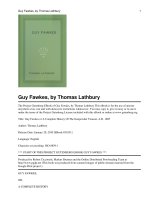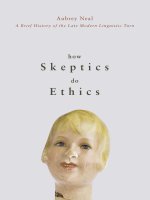A little history of the world
Bạn đang xem bản rút gọn của tài liệu. Xem và tải ngay bản đầy đủ của tài liệu tại đây (38.26 MB, 455 trang )
Tai Lieu Chat Luong
ALITTLEHISTORYOFTHEWORLD
MorepraiseforALittleHistoryoftheWorld
‘Iamgoingtobuytencopiesofthisbookandgiveittomytenfavourite
children…Thisisabookwhichteacheswhatitistobecivilizedbyitsverytone,
whichisoneofgentleness,curiosityanderudition.’
—A.N.Wilson,TimesLiterarySupplement
‘[Gombrich]excelsincreatingasenseofthecontinuitiesofhistory–thewaysin
whichhumannaturehasnotbudgedoverthemillennia,andthesmallnessofthe
differencesbetweenpeople.Adelight.’
—RobertHanks,DailyTelegraph
‘GombrichopenswiththemostmagicaldefinitionofhistoryIhaveeverread...
.Tolerance,reasonandhumanity...suffuseeverypage.’
—AmandaVickery,TheGuardian
‘retainsanirresistible,boyishenergyandenthusiasm...Here,inthislittlebook
areanswerstomanyofthequestionsyouneverdaredtoask.’
—MargaretDrabble,NewStatesman
‘Anengrossingkaleidoscopicaccountofglobalhistory.’
—TristramHunt,BBCHistoryMagazine
‘Abedtimetreattosharewithmytwochildrenandproofthatbrillianceand
perspicacityneedn’tbestuffy.
—BettanyHughes,TheTimes
‘Thrilling,opinionated,withcrashingjudgmentsandtheboringbitsleftout,A
LittleHistoryoftheWorldturnsoutnottobeastorytoldbyyourgrandfather,
butbyyourimpossiblycoolbigbrother…Ajoyfulbook.’
—IrishTimes
‘AsanoutlineofhowwehavecometobewhereweareIdoubtifitcouldbe
bettered.Itcertainlycouldn’tbedonemoreagreeably:aperfectbirthdaypresent
forachildwithaninquiringmind.IwishithadbeenavailablewhenIwas
young.’
—AllanMassie,LiteraryReview
‘TheLittleHistorygripsthereaderwithitsvividaccountsofordinarypeopleand
ofworld-shakingevents.Asinallofhisextraordinaryworks,Gombrich
illuminatesthepresentdaywithhishumaneandfascinatinginsightsintothe
past.’
—RAMagazine
‘Thetruefairytaleoftheevolutionofmankind.’
—DieZeit
‘Athingofrippingyarnstoldatarattlingpace.HadIadozengrandchildren(of
anyage)I’dordertwodozencopies,oneforthechildren,theotherfortheir
parents.Donot…underestimatethisbook.’
—BrianSewell,TheEveningStandard
‘Anenduringjoy…Wehavenoshortageofhistorianseagertotelluswhatwas
importantinthepastandwhy;butfewofthemdarespeakstraighttothe
imaginationofyoungpeople,toopentheirmindsandtoenrichtheirvisionin
themannerthatGombrichachievessoeffortlesslyhere.’
—PeterFurtado,TimesHigherEducationSupplement
‘[Gombrich’s]humanismisalessonforall.’
—RaymondCarr,TheSpectator
‘Amasterpieceofnonfictionwritingforchildren.Itisawryandcharmingbook,
perfectlysuitedtothecapacitiesofa10-year-old,butalsoremarkablyfreeof
perfectlysuitedtothecapacitiesofa10-year-old,butalsoremarkablyfreeof
condescension.Anadultcanreaditwithpleasure.And,indeed,with
instruction.’
—ScottMcLemee,Newsday
E.H.
GOMBRICH
ALITTLE
HISTORY
OFTHE
WORLD
ILLUSTRATEDEDITION
TRANSLATEDBYCAROLINEMUSTILL
YALEUNIVERSITYPRESS|NEWHAVENANDLONDON
TheEstateofE.H.Gombrichwouldliketothank,forinformationandadvice:PatrickBoyde,HenryFrench,
RhodriHayward,theOxfordUniversityMuseumofNaturalHistory,J.B.Trappand,inparticular,Adrian
Lyttelton.
Copyright©1985byDuMontLiteraturundKunstVerlagGmbHundCo.KG,Cologne,Germany
FirstpublishedinEnglishin2005;paperbackedition2008.
Thisillustratededitionfirstpublishedin2011
Englishtranslationcopyright©2005byCarolineMustill
PrefacetotheEnglishedition©2011byLeonieGombrich
PublishedinGermanasEinekurzeWeltgeschichtefürjungeLeserbyErnstH.Gombrich
OriginallypublishedunderthetitleWeltgeschichtevonderUrzeitbiszurGegenwartbySteyrermühl-Verlag,
Viennain1936
Allrightsreserved.Thisbookmaynotbereproducedinwholeorinpart,inanyform(beyondthatcopying
permittedbySections107and108oftheU.S.CopyrightLawandexceptbyreviewersforthepublicpress)
withoutwrittenpermissionfromthepublishers.
ForinformationaboutthisandotherYaleUniversityPresspublications,pleasecontact:
U.S.Office:www.yalebooks.com
EuropeOffice:sales@yaleup.co.ukwww.yaleup.co.uk
SetinMinionbyYaleUniversityPress
PrintedinChinabyWorldprint
LibraryofCongressCataloging-in-PublicationData
Gombrich,E.H.(ErnstHans),1909-2001.
[KurzeWeltgeschichtefürJungeLeser.English]
Alittlehistoryoftheworld:illustratededition/E.H.Gombrich.
p.cm.
Originallypublishedin2005withaddedillustrations.
ISBN978-0-300-17614-8(cl:alk.paper)
1.Worldhistory—Juvenileliterature.I.Title.
D23.G64132011
909—dc23
2011027503
AcataloguerecordforthisbookisavailablefromtheBritishLibrary.
10987654321
FürIlse
WieDustetsDir’sangehört
AlsostetsDir’sangehört
CONTENTS
PREFACE
1ONCEUPONATIME
The past and memory – Before there were any people – Dragonlike creatures – Earth without life – Sun
withoutearth–Whatishistory?
2THEGREATESTINVENTORSOFALLTIME
The Heidelberg jaw – Neanderthal man – Prehistory – Fire – Tools – Cavemen – Language – Painting –
Makingmagic–TheIceAgeandtheEarlyStoneAge–Piledwellings–TheBronzeAge–Peoplelikeyou
andme
3THELANDBYTHENILE
KingMenes–Egypt–AhymntotheNile–Pharaohs–Pyramids–ThereligionoftheancientEgyptians–
TheSphinx–Hieroglyphs–Papyrus–Revolutionintheoldkingdom–Akhenaton’sreforms
4SUNDAY,MONDAY…
Mesopotamiatoday–TheburialsitesatUr–Claytabletsandcuneiformscript–Hamurabi’slaws–Star
worship–Theoriginofthedaysoftheweek–TheTowerofBabel–Nebuchadnezzar
5THEONEANDONLYGOD
Palestine–AbrahamofUr–TheFlood–Moses’bondageinEgyptandtheyearofthedeparturefromEgypt
–Saul,David,Solomon–Thedivisionofthekingdom–ThedestructionofIsrael–Theprophetsspeak–
TheBabylonianCaptivity–TheReturn–TheOldTestamentandfaithintheMessiah
6IC-A-NR-E-A-D
Writingwiththealphabet–ThePhoeniciansandtheirtradingposts
7HEROESANDTHEIRWEAPONS
ThesongsofHomer–Schliemann’sexcavations–Sea-raiderkings–Creteandthelabyrinth–TheDorian
migration–Thesongsoftheheroes–Greektribesandtheircolonies
8ANUNEQUALSTRUGGLE
ThePersiansandtheirfaith–CyrusconquersBabylon–CambysesinEgypt–Darius’sempire–TheIonian
revolt – The first Punitive Expedition – The second Punitive Expedition and the Battle of Marathon –
Xerxes’campaign–Thermopylae–TheBattleofSalamis
9TWOSMALLCITIESINONESMALLLAND
TheOlympicGames–TheDelphicOracle–SpartaandSpartaneducation–Athens–DracoandSolon–
The People’s Assembly and tyrants – The time of Pericles – Philosophy – Sculpture and painting –
Architecture–Theatre
10THEENLIGHTENEDONEANDHISLAND
India–Mohenjo-Daro,acityfromthetimeofUr–TheIndianmigrations–Indo-Europeanlanguages–
Castes–Brahmaandthetransmigrationofsouls–‘Thisisyou’–PrinceGautama–TheEnlightenment–
Releasefromsufffering–Nirvana–ThefollowersoftheBuddha
11THEGREATTEACHEROFAGREATPEOPLE
ChinainthetimebeforeChrist–TheemperorofChinaandtheprinces–ThemeaningofChinesewriting–
Confucius–Theimportanceofpracticesandcustoms–Thefamily–Rulerandsubject–Lao-tzu–TheTao
12THEGREATESTADVENTUREOFALL
ThePeloponnesianWar–TheDelphicWar–PhilipofMacedon–TheBattleofChaeronea–Thedeclineof
the Persian empire – Alexander the Great – The destruction of Thebes – Aristotle and his knowledge –
Diogenes–TheconquestofAsiaMinor–TheGordionKnot–TheBattleofIssus–TheconquestofTyre
and the conquest of Egypt – Alexandria – The Battle of Gaugamela – The Indian expedition – Porus –
Alexander, ruler of the Orient – Alexander’s death and his successors – Hellenism – The library of
Alexandria
13NEWWARSANDNEWWARRIORS
Italy – Rome and the myth of Rome’s foundation – Class warfare – The twelve tablets of the law – The
Romancharacter–Rome’scapturebytheGauls–TheconquestofItaly–Pyrrhus–Carthage–TheFirst
PunicWar–Hannibal–CrossingtheAlps–QuintusFabiusMaximus–Cannae–Thelastcalltoarms–
Scipio’svictoryoverHannibal–TheconquestofGreece–Cato–ThedestructionofCarthage
14ANENEMYOFHISTORY
TheEmperorShihHuang-tiofCh’in–Theburningofthebooks–TheprincesofCh’inandthenamingof
China–TheGreatWallofChina–TheHanrulingfamily–Learnedofficials
15RULERSOFTHEWESTERNWORLD
Romanprovinces–Roadsandaqueducts–Legions–ThetwoGracchi–Breadandcircuses–Marius–The
CimbriandtheTeutones–Sulla–Gladiators–JuliusCaesar–TheGallicWars–Victoryinthecivilwar–
Cleopatra–Thereformofthecalendar–Caesar’smurder–Augustusandtheempire–Thearts
16THEGOODNEWS
JesusChrist–TheteachingsoftheApostlePaul–TheCross–PaulpreachingtotheCorinthians–Thecult
oftheemperor–Nero–Romeburns–ThefirstChristianpersecutions–Thecatacombs–Titusdestroys
Jerusalem–ThedispersaloftheJews
17LIFEINTHEEMPIREANDATITSFRONTIERS
Tenementsandvillas–Therms–TheColosseum–TheGermans–ArminiusandthebattleinTeutoburg
forest–TheLimes–Soldiersandtheirgods–Trajan’sexpeditionsinDacia–MarcusAurelius’sbattlesnear
Vienna–Warrior-emperors–ThedeclineofItaly–ThespreadofChristianity–Diocletian’sreforms–The
lastChristianpersecution–Constantine–ThefoundingofConstantinople–Thedivisionoftheempire–
Christianitybecomesthereligionofthestate
18THESTORM
TheHuns–TheVisigoths–TheMigrations–Attila–LeotheGreat–RomulusAugustulus–Odoacerand
theendofantiquity–TheOstrogothsandTheodoric–Ravenna–Justinian–ThePandectsofJustinianand
theAgiaSophia–TheendoftheGoths–TheLombards
19THESTARRYNIGHTBEGINS
‘TheDarkAges’?–Beliefandsuperstition–Stylites–Benedictines–Preservingtheinheritanceofantiquity
– The importance of the northern monasteries – Clovis’s baptism – The role of the clergy in the
Merovingiankingdom–Boniface
20THEREISNOGODBUTALLAH,ANDMUHAMMADISHISPROPHET
TheArabiandesert–MeccaandtheKaaba–Muhammad’sbackgroundandlife–Persecutionandflight–
Medina– The battlewith Mecca –The last sermon– The conquestsof Palestine, Persiaand Egypt –The
burningoftheAlexandrianlibrary–ThesiegeofConstantinople–TheconquestsofNorthAfricaandSpain
–ThebattlesofToursandPoitiers–Arabculture–Arabicnumerals
21ACONQUERORWHOKNOWSHOWTORULE
TheMerovingiansandtheirstewards–ThekingdomoftheFranks–Charlemagne’sbattlesinGaul,Italy
andSpain–TheAvars–BattleswiththeSaxons–TheHeldenlieder–Thecrowningoftheemperor–Harun
al-Rashid’sambassadors–ThedivisionanddeclineoftheCarolingianempire–Svatopluk–TheVikings–
ThekingdomsoftheNormans
22ASTRUGGLETOBECOMELORDOFCHRISTENDOM
East and West in Carolingian times – The blossoming of culture in China – The Magyar invasion – King
Henry–OttotheGreat–AustriaandtheBabenbergs–Feudalismandserfdom–HughCapet–TheDanes
inEngland–Religiousappointments–TheInvestitureControversy–GregoryVIIandHenryIV–Canossa
–RobertGuiscardandWilliamtheConqueror
23CHIVALROUSKNIGHTS
Horsemen and knights – Castles – Bondsmen – From noble youth to knight: page, squire, dubbing – A
knight’sduties–Minstrelsy–Tournaments–Chivalrouspoetry–TheSongoftheNibelungen–TheFirst
Crusade–GodfreyofBouillonandtheconquestofJerusalem–Thesignificanceofthecrusades
24EMPERORSINTHEAGEOFCHIVALRY
FrederickBarbarossa–Barterandthemoney-basedeconomy–Italiantowns–Theempire–Theresistance
and defeat of Milan – The dubbing feast at Mainz – The Third Crusade – Frederick II – Guelphs and
Ghibellines–InnocentIII–TheMagnaCarta–Sicily’srulers–TheendoftheHohenstaufens–Ghengis
KhanandtheMongolinvasion–Thelackofanemperorand‘fist-law’–TheKyffhäuserlegend–Rudolfof
Habsburg–VictoryoverOtakar–ThepoweroftheHouseofHabsburgisestablished
25CITIESANDCITIZENS
Markets and towns – Merchants and knights – Guilds – Building cathedrals – Mendicant friars and
penitential priests – The persecution of Jews and heretics – The Babylonian Captivity of the popes – The
HundredYearsWarwithEngland–JoanofArc–Lifeatcourt–Universities–CharlesIVandRudolfthe
Founder
26ANEWAGE
TheburghersofFlorence–Humanism–Therebirthofantiquity–Thefloweringofart–LeonardodaVinci
– The Medici – Renaissance popes – New ideas in Germany – The art of printing – Gunpowder – The
downfallofCharlestheBold–Maximilian,theLastKnight–Mercenaries–FightinginItaly–Maximilian
andDürer
27ANEWWORLD
Thecompass–SpainandtheconquestofGranada–ColumbusandIsabella–ThediscoveryofAmerica–
The modern era – Columbus’s fate – The conquistadores – Hernando Cortez – Mexico – The fall of
Montezuma–ThePortugueseinIndia
28ANEWFAITH
ThebuildingoftheChurchofStPeter–Luther’stheses–Luther’sforerunner,Hus–Theburningofthe
papalbull–CharlesVandhisempire–ThesackofRome–TheDietofWorms–LutherattheWartburg–
The translation of the Bible – Zwingli – Calvin – Henry VIII – Turkish conquests – The division of the
empire
29THECHURCHATWAR
Ignatius of Loyola – The Council of Trent – The Counter-Reformation – The St Bartholomew’s Day
Massacre–PhilipofSpain–TheBattleofLepanto–TherevoltoftheLowCountries–ElizabethofEngland
–MaryStuart–ThesinkingoftheArmada–EnglishtradingpostsinAmerica–TheEastIndiaCompanies
–ThebeginningsoftheBritishempire
30TERRIBLETIMES
TheDefenestrationofPrague–TheThirtyYearsWar–GustavusAdolphus–Wallenstein–ThePeaceof
Westphalia – The devastation of Germany – The persecution of witches – The birth of a scientific
understandingoftheworld–Nature’slaws–Galileoandhistrial
31ANUNLUCKYKINGANDALUCKYKING
TheStuartking,CharlesI–CromwellandthePuritans–TheriseofEngland–TheyearoftheGlorious
Revolution–France’sprosperity–Richelieu’spolicies–Mazarin–LouisXIV–Aking’slever–Versailles–
Sourcesofthegovernment’swealth–Thepeasants’misery–Predatorywars
32MEANWHILE,LOOKINGEASTWARDS…
Turkishconquests–InsurrectioninHungary–ThesiegeofVienna–JanSobieskiandthereliefofVienna–
PrinceEugene–IvantheTerrible–PetertheGreat–ThefoundingofStPetersburg–CharlesXIIofSweden
–TheracetoStralsund–TheexpansionofRussianmight
33ATRULYNEWAGE
TheEnlightenment–Tolerance,reasonandhumanity–CritiqueoftheEnlightenment–TheriseofPrussia
–FredericktheGreat–MariaTheresa–ThePrussianarmy–TheGrandCoalition–TheSevenYearsWar–
JosephII–Theabolitionofserfdom–Overhastyreforms–TheAmericanWarofIndependence–Benjamin
Franklin–Humanrightsandnegroslaves
34AVERYVIOLENTREVOLUTION
CatherinetheGreat –Louis XVandLouis XVI– Lifeat court–Justice andthe landowningnobility The
Rococo–MarieAntoinette–TheconvocationoftheEstates-General–ThestormingoftheBastille–The
sovereigntyofthepeople–TheNationalAssembly–TheJacobins–TheguillotineandtheRevolutionary
Tribunal – Danton – Robespierre – The Reign of Terror – The sentencing of the king – The foreigners
defeated–Reason–TheDirectory–Neighbouringrepublics
35THELASTCONQUEROR
NapoleoninCorsica–ToParis–ThesiegeofToulon–TheconquestofItaly–TheEgyptianexpedition–
Thecoupd’état–TheconsulateandtheCodeNapoléon–EmperoroftheFrench–VictoryatAusterlitz–
TheendoftheHolyRomanEmpireoftheGermanNation–FrancisI–TheContinentalSystem–Victory
overRussia–SpainandtheWarofSpanishResistance–AspernandWagram–TheGermanuprising–The
GrandeArmée–TheretreatfromMoscow–TheBattleofLeipzig–TheCongressofVienna–Napoleon’s
returnfromElba–Waterloo–StHelena
36MENANDMACHINES
The Biedermeier era – Steam engines, steamships, locomotives, the telegraph – Spinning machines and
mechanical looms – Coal and iron – Luddites – Socialist ideas – Marx and his theory of class war –
Liberalism–Therevolutionsof1830and1848
37ACROSSTHESEAS
China before 1800 – The Opium war – The Taiping Rebellion – China’s submission – Japan in 1850 –
RevolutioninsupportoftheMikado–Japan’smodernisationwithforeignassistance–Americaafter1776–
Theslavestates–TheNorth–AbrahamLincoln–TheCivilWar
38TWONEWSTATESINEUROPE
Europe after 1848 – The Emperor Franz Josef and Austria – The German Confederation – France under
Napoleon III – Russia – Spain’s decline – The liberation of the peoples of the Balkans – The fight for
Constantinople–ThekingdomofSardinia–Cavour–Garibaldi–Bismarck–Thereformofthearmyin
defianceoftheconstitution–TheBattleofKöniggrätz–Sedan–ThefoundingoftheGermanempire–The
ParisCommune–Bismarck’ssocialreforms–DismissaloftheIronChancellor
39DIVIDINGUPTHEWORLD
Industry–Marketsandsourcesofrawmaterials–BritainandFrance–TheRusso-JapaneseWar–Italyand
Germany – The race to mobilize – Austria and the East – The outbreak of the First World War – New
weapons–RevolutioninRussia–TheAmericanintervention–Thetermsofpeace–Scientificadvance–
End
40THESMALLPARTOFTHEHISTORYOFTHEWORLDWHICHIHAVE
LIVEDTHROUGHMYSELF:LOOKINGBACK
Thegrowthoftheworld’spopulation–Thedefeatofthecentral-EuropeanpowersduringtheFirstWorld
War–Theincitementofthemasses–ThedisappearanceoftolerancefrompoliticallifeinGermany,Italy,
JapanandSovietRussia–EconomiccrisisandtheoutbreakoftheSecondWorldWar–Propagandaand
reality – The murder of the Jews – The atomic bomb – The blessings of science – The collapse of the
Communistsystem–Internationalaideffortsasareasonforhope
LISTOFILLUSTRATIONS
INDEX
E.H.GOMBRICHIN1935
E.H.GOMBRICHWITHHISGRANDCHILDREN,CARLANDLEONIE,1972
PREFACE
M
YGRANDFATHER,ERNSTGOMBRICH,ISBESTKNOWNASAN
art historian. Besides many important academic publications, his
popular introduction to art history, The Story of Art, has made him
knowntomillionsofreadersaroundtheworld.ButhaditnotbeenforALittle
HistoryoftheWorld,TheStoryofArtwouldneverhavebeenwritten.
Tounderstandhowithappened–andwhythis,hisveryfirstbook,hasnever
appearedinEnglishuntilnowdespitebeingavailableineighteenotherlanguages
– we need to start in Vienna in 1935, when my grandfather was still a young
man.
AfterErnstGombrichhadfinishedhisstudiesattheUniversityofVienna,he
wasunemployedand,inthosedifficulttimes,withoutprospectofajob.Ayoung
publisherwithwhomhewasacquaintedaskedhimtotakealookataparticular
English history book for children, with a view to translating it into German. It
was intended for a new series called Wissenschaft für Kinder (‘Knowledge for
Children’)andhadbeensentbyamutualfriendwhowasstudyingmedicinein
London.
Mygrandfatherwasnotimpressedbywhatheread:solittlesothathetoldthe
publisher–WalterNeurathwholaterfoundedthepublishinghouseThames&
HudsoninEngland–thatitwasprobablynotworthtranslating.‘IthinkIcould
write a better one myself,’ he said. To which Neurath responded that he was
welcometosubmitachapter.
It so happened that, in the final stages of writing his doctoral thesis, my
grandfather had been corresponding with a little girl who was the daughter of
some friends. She wanted to know what was keeping him so busy, and he
enjoyed trying to explain his subject to her in ways she would understand. He
was also, he said later, feeling a little impatient with academic writing, having
wadedthroughsomuchofitinthecourseofhisstudies,andwasconvincedthat
it should be perfectly possible to explain most things to an intelligent child
withoutjargonorpompouslanguage.Sohewrotealivelychapterontheageof
chivalryandsubmittedittoNeurath–whowasmorethanhappywithit.‘But,’
hesaid,‘inordertomeettheschedulethatwasintendedforthetranslation,Iwill
needafinishedmanuscriptinsixweeks’time.’
Mygrandfatherwasn’tsurethatitcouldbedone,buthelikedthechallenge
and agreed to try. He plotted out the book at speed, selecting episodes for
inclusion by asking himself simply which events of the past had touched most
livesandwerebestremembered.Hethensetouttowriteachapteraday.Inthe
morning,hewouldreadupontheday’stopicfromwhatbookswereavailablein
hisparents’house–includingabigencyclopaedia.Intheafternoon,hewouldgo
tothelibrarytoseekout,whereverpossible,sometextsbelongingtotheperiods
he was writing about, to give authenticity to his account. Evenings were for
writing.TheonlyexceptionswereSundays–buttoexplainaboutthese,Imust
firstintroducemygrandmother.
Ilse Heller, as my grandmother was then called, had come to Vienna from
Bohemiaaboutfiveyearsearliertopursueherpianostudies.Shewassoontaken
onasapupilbyLeonieGombrich,afterwhomIamnamed.Leonieintroduced
Ilse to Ernst, and encouraged my grandfather to show her pupil some of the
galleriesandarchitecturalsplendoursofVienna.By1935theirweekendoutings
togetherwerewellestablished–andinfact,theymarriedthefollowingyear.And
one Sunday, as my grandmother remembers it, they were walking in the
Wienerwald and had stopped for a break – ‘Perhaps in a sunny clearing,’ she
says,‘sittingonthegrassoronafallentree…’–whenmygrandfatherpulleda
sheaf of papers from inside his jacket and said, ‘Do you mind if I read you
something?’
‘Well,itwasbetterthathereadit,’saysmygrandmothernow.‘Eventhen,you
know,Ernst’shandwritingwasverydifficult.’
Thatsomething,ofcourse,wastheLittleHistory.Evidentlyshelikedit,and
thereadingscontinuedforthenextsixweeksuntilthebookwasdone–forhe
deliveredittoNeurathontime.Ifyoureaditaloud,youwillfindhowbeautifully
those readings shaped the telling of it; the dedication gives an idea of how he
appreciated them. The original illustrations were produced by a former riding
instructor, and my grandfather liked to point out that the numerous horses he
includedinhispicturesweremoreskilfullydrawnthanthepeople.
Whenthebookcameoutin1936,titledEinekurzeWeltgeschichtefürjunge
Leser,itwasverywellreceived,reviewersassumingthatmygrandfathermustbe
anexperiencedteacher.Withinquiteashorttime,ithadbeentranslatedintofive
otherlanguages–butbythen,mygrandparentswerealreadyinEngland,where
they were to remain. In the end, the Nazis stopped publication, not for racial
reasonsbutbecausetheyconsideredtheoutlook‘toopacifist’.
However, the seed had been planted and, despite his other concerns, my
grandfathereventuallyrespondedtorequestsforasequel,thistimefocusingon
art history. This became The Story of Art – not for children because, my
grandfathersaid,‘Thehistory ofartis notatopicfor children’,butforslightly
older readers. It has remained in print since 1950 and continues to make new
friendsinmorethanthirtynations.
But the first edition of the Little History, which preceded its better-known
cousin,layinadrawerinNorthLondon.Sometimeafterthewarhadended,my
grandfathermanagedtoreclaimhiscopyright,butbythentheworldinwhichhe
had written the book seemed very far away. So nothing happened until, more
thanthirtyyearslater,hereceivedanenquiryfromaGermanpublisherwho,on
reading the book, was captivated by its energy and vivid language. A second
German edition was published with a new final chapter – and once again, my
grandfather was surprised and delighted by the book’s success and the many
translationsthathavefollowed.Hetookacheerfulinterestintailoringeditions
for audiences of different nationalities, and was always ready to listen to the
suggestionsofthevarioustranslators.Therewasonecaveat,though.Apartfrom
theLittleHistory,mygrandfatherwroteallhisbooksinEnglish:iftherewasever
tobeanEnglishedition,hewasgoingtotranslateithimself.
Then,fortenyears,anddespiterepeatedapproaches,herefusedtodoso.It
wasn’tjustthathewasbusy,althoughthatwasalsotrue.Englishhistory,hesaid,
was all about English kings and queens – would a European perspective mean
anything to English-speaking children? It took the events of the 1990s, and
Britain’s increasing involvement in the European Union – as well as my
grandmother’stactfulencouragement–toconvincehimthattheymight.
And so, at the very end of his long and distinguished life, he embarked on
producing a new, English version of the book with which he had started. ‘I’ve
beenlookingatmyLittleHistory,’hetoldmewithmodestsurprise,shortlyafter
hebegan,‘andthere’sactuallyalotinit.Youknow,Ireallythinkit’sgood!’
Ofcourse,hemadecorrections.Headdednewinformationaboutprehistoric
man. He asked his son – my father – who is an expert on Early Buddhism, to
advise on changes to Chapter 10, while his assistant, Caroline Mustill, helped
withthesectionsonChinesehistory.ItisourgreatgoodfortunethatCaroline
workedwithhimsoclosely,forhewasstillengagedinthetaskoftranslatingand
updating when he died, at the age of ninety-two. With his blessing, she has
completed this difficult task meticulously and beautifully. Some changes, of
course, could not be made without him: we know that he intended to add
chaptersaboutShakespeareandabouttheBillofRights,andnodoubthewould
haveexpandedon,forexample,hisverybrieftreatmentoftheEnglishCivilWar
and the birth of parliamentary democracy, which carried less weight for the
Viennese graduate who wrote the book than for the British citizen he became.
But how he would have explained these things we could not guess, and so the
areas he did not revise himself were left as his thousands of readers in other
countriesalreadyappreciatedthem.
Revisions, in any case, are perhaps beside the point. What matters is his
obvioussensethatthepursuitofhistory–indeed,alllearning–isanenquiryto
be enjoyed. When Yale University Press published the first English language
editionin2005,itsoonbecameapparentthathisEnglish-speakingreaderswere
just as happy to share his enthusiasm. With the publication of this illustrated
newedition,Iliketothinkhowpleasedhewouldhavebeentoseethedelightful
visualdimensionthathasbeenaddedtotheenquiry.
‘I want to stress,’ he wrote, in his preface to the Turkish edition some years
ago,‘thatthisbookisnot,andneverwas,intendedtoreplaceanytextbooksof
historythatmayserveaverydifferentpurposeatschool.Iwouldlikemyreaders
to relax, and to follow the story without having to take notes or to memorise
namesanddates.Infact,IpromisethatIshallnotexaminethemonwhatthey
haveread.’
LeonieGombrich,June2011
E.H.GOMBRICHc.1935
CHAPTER1
ONCEUPONATIME
A
LL STORIES BEGIN WITH ‘ONCE UPON A TIME’. AND THAT’S
JUST WHAT this story is all about: what happened, once upon a time.
Onceyouweresosmallthat,evenstandingontiptoes,youcouldbarely
reach your mother’s hand. Do you remember? Your own history might begin
likethis:‘Onceuponatimetherewasasmallboy’–orasmallgirl–‘andthat
small boy was me.’ But before that you were a baby in a cradle. You won’t
rememberthat,butyouknowit’strue.Yourfatherandmotherwerealsosmall
once,andsowasyourgrandfather,andyourgrandmother,amuchlongertime
ago, but you know that too. After all, we say: ‘They are old.’ But they too had
grandfathers and grandmothers, and they, too, could say: ‘Once upon a time’.
And so it goes on, further and further back. Behind every ‘Once upon a time’
thereisalwaysanother.Haveyouevertriedstandingbetweentwomirrors?You
should.Youwillseeagreatlonglineofshinymirrors,eachonesmallerthanthe
onebefore,stretchingawayintothedistance,gettingfainterandfainter,sothat
youneverseethelast.Butevenwhenyoucan’tseethemanymore,themirrors
stillgoon.Theyarethere,andyouknowit.
And that’s how it is with ‘Once upon a time’. We can’t see where it ends.
Grandfather’s grandfather’s grandfather’s grandfather … it makes your head
spin. But say it again, slowly, and in the end you’ll be able to imagine it. Then
addonemore.Thatgetsusquicklybackintothepast,andfromthereintothe
distant past. But you will never reach the beginning, because behind every
beginningthere’salwaysanother‘Onceuponatime’.
It’slikeabottomlesswell.Doesallthislookingdownmakeyoudizzy?Itdoes
me. So let’s light a scrap of paper, and drop it down into that well. It will fall
slowly,deeperanddeeper.Andasitburnsitwilllightupthesidesofthewell.
Canyouseeit?It’sgoingdownanddown.Nowit’ssofardownit’slikeatiny
starinthedarkdepths.It’sgettingsmallerandsmaller…andnowit’sgone.
Ourmemoryislikethatburningscrapofpaper.Weuseittolightupthepast.
Firstofallourown,andthenweaskoldpeopletotelluswhattheyremember.
Afterthatwelookforletterswrittenbypeoplewhoarealreadydead.Andinthis
waywelightourwayback.Therearebuildingsthatarejustforstoringoldscraps
ofpaperthatpeopleoncewroteon–theyarecalledarchives.Inthemyoucan
find letters written hundreds of years ago. In an archive, I once found a letter
whichjustsaid:‘DearMummy,Yesterdayweatesomelovelytruffles,lovefrom
William.’ William was a little Italian prince who lived four hundred years ago.
Trufflesareaspecialsortofmushroom.
Butweonlycatchglimpses,becauseourlightisnowfallingfasterandfaster:a
thousandyears…fivethousandyears…tenthousandyears.Eveninthosedays
there were children who liked good things to eat. But they couldn’t yet write
letters.Twentythousand…fiftythousand…andeventhenpeoplesaid,aswe
do,‘Onceuponatime’.Nowourmemory-lightisgettingverysmall…andnow
it’sgone.Andyetweknowthatitgoesonmuchfurther,toatimelong,longago,
before there were any people and when our mountains didn’t look as they do
today.Someofthemwerebigger,butastherainpoureddownitslowlyturned
them into hills. Others weren’t there at all. They grew up gradually, out of the
sea,overmillionsandmillionsofyears.
Butevenbeforethemountainstherewereanimals,quitedifferentfromthose
oftoday.Theywerehugeandlookedratherlikedragons.Andhowdoweknow
that? We sometimes find their bones, deep in the ground. When I was a
schoolboyinViennaIusedtovisittheNaturalHistoryMuseum,whereIloved
to gaze at the great skeleton of a creature called a Diplodocus. An odd name,
Diplodocus.Butanevenoddercreature.Itwouldn’tfitintoaroomathome–or
eventwo,forthatmatter.Itwasastallasaverytalltree,anditstailwashalfas
long as a football pitch. What a tremendous noise it must have made, as it
muncheditswaythroughtheprimevalforest!
But we still haven’t reached the beginning. It all goes back much further –
thousandsofmillionsofyears.That’seasyenoughtosay,butstopandthinkfor
amoment.Doyouknowhowlongonesecondis?It’saslongascounting:one,
two,three.Andhowaboutathousandmillionseconds?That’sthirty-twoyears!
Now,trytoimagineathousandmillionyears!Atthattimetherewerenolarge
animals,justcreatureslikesnailsandworms.Andbeforethenthereweren’teven
anyplants.Thewholeearthwasa‘formlessvoid’.Therewasnothing.Notatree,
notabush,notabladeofgrass,notaflower,nothinggreen.Justbarrendesert
rocksandthesea.Anemptysea:nofish,noseashells,notevenanyseaweed.But
if you listen to the waves, what do they say? ‘Once upon a time …’ Once the
earth was perhaps no more than a swirling cloud of gas and dust, like those
other,farbiggeroneswecanseetodaythroughourtelescopes.Forbillionsand
trillions of years, without rocks, without water and without life, that swirling
cloudofgasanddustmaderingsaroundthesun.Andbeforethat?Beforethat,
not even the sun, our good old sun, was there. Only weird and amazing giant
starsandsmallerheavenlybodies,whirlingamongthegascloudsinaninfinite,
infiniteuniverse.
‘Onceuponatime’–butnowallthispeeringdownintothepastismaking
mefeeldizzyagain.Quick!Let’sgetbacktothesun,toearth,tothebeautifulsea,
toplantsandsnailsanddinosaurs,toourmountains,and,lastofall,tohuman
beings.It’sabitlikecominghome,isn’tit?Andjustsothat‘Onceuponatime’
doesn’tkeepdraggingusbackdownintothatbottomlesswell,fromnowonwe’ll
alwaysshout:‘Stop!Whendidthathappen?’
Andifwealsoask,‘Andhowexactlydidthathappen?’wewillbeaskingabout
history. Not just a story, but our story, the story that we call the history of the
world.Shallwebegin?
DIPLODOCUS
CHAPTER2
THEGREATEST
INVENTORS
OFALLTIME
N
EAR HEIDELBERG, IN GERMANY, SOMEBODY WAS ONCE
DIGGINGAPITwhentheycameacrossabone,deepdownunderthe
ground. It was a human bone. A jawbone. But no human beings today
have jaws like this one. It was so massive and strong, and had such powerful
teeth!Whoeverowneditmusthavebeenabletobitereallyhard.Andmusthave
livedalongtimeagoforthebonetobeburiedsodeep.
Onanotheroccasion,butstillinGermany–intheNeandervalley–ahuman
skullwasfound.Andthiswasalsoimmenselyinterestingbecausenobodyalive
todayhasaskulllikethisoneeither.Insteadofaforeheadlikeoursitjusthad
twothickridgesabovetheeyebrows.Now,ifallourthinkinggoesonbehindour
foreheadsandthesepeopledidn’thaveanyforeheads,thenperhapstheydidn’t
thinkasmuchaswedo.Oratanyrate,thinkingmayhavebeenharderforthem.
So the people who examined the skull concluded that once upon a time there
were people who weren’t very good at thinking, but who were better at biting
thanwearetoday.









